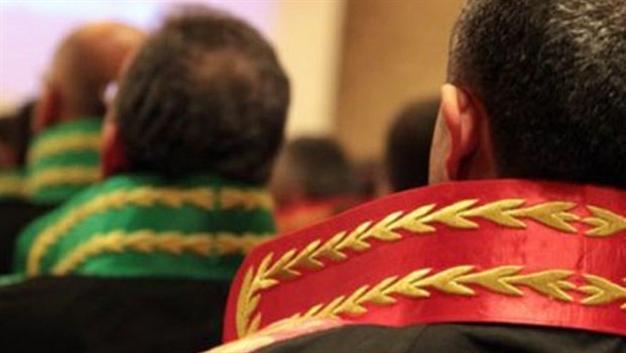Turkish gov’t shakes up judiciary with decree shifting more than 3,700 judges, prosecutors
Oya Armutçu - ANKARA
 Turkey has witnessed a wave of resuhuffle in the judiciary, one of the most extensive decrees in the history of the modern Turkish Republic, with the government replacing more than 3,700 judges and prosecutors, at a time when President Recep Tayyip Erdoğan has yet to ratify a bill stripping scores of lawmakers of their legislative immunity from prosecution.
Turkey has witnessed a wave of resuhuffle in the judiciary, one of the most extensive decrees in the history of the modern Turkish Republic, with the government replacing more than 3,700 judges and prosecutors, at a time when President Recep Tayyip Erdoğan has yet to ratify a bill stripping scores of lawmakers of their legislative immunity from prosecution.With the decree, the Supreme Council of Judges and Prosecutors (HSYK) has completed the 2016 Civil and Administrative Judiciary Main Decree. The enactment consisted of the relocation of 3,228 judges and prosecutors in the civil jurisdiction and 518 judges and prosecutors in the administrative jurisdiction.
In an announcement posted on the HSYK’s website yesterday, it was stated that the decree was announced in accordance with the declared calendar. Those who requested an enquiry were asked to submit their requests by June 16.
With the decree, Murat Aydın, who appealed to the Constitutional Court for the annulment of controversial Article 299 of the Turkish Penal Code, the article on insulting the president, as well as his spouse, Gülay Aydın, have been exiled.
“I have been exiled to the Trabzon Office of Judges by the HSYK due to rulings I made, views that I expressed and the stance that I have displayed. Since exiling me was not sufficient to dampen their schadenfreude, they have exiled my spouse, Judge Gülay Aydın too. Discretion belongs to my nation on behalf of whom I use the authority of the judiciary,” Aydın said.
While the judge in Gemerek, Sivas, was assigned to Sungurlu, Çorum, the head of the 6th Ankara Heavy Penal Court who ruled the case into killing of Ethem Sarısülük and the case into assassination of Musa Anter was downgraded to the Sincan magistracy.
Sarısülük was shot and killed by police officer Ahmet Şahbaz when police moved in on protesters in Ankara’s central Kızılay Square on June 1, 2013, during the Gezi Park unrest.
Kurdish author Anter was murdered in an armed attack in the southeastern province of Diyarbakır in 1992.
One of the darkest unsolved murders in Turkey’s history, another author, Orhan Miroğlu, now a deputy of the ruling Justice and Development Party (AKP), was also seriously wounded in the attack.
While Bakırköy Deputy Public Prosecutor Engin Uçak who sued the prosecutors that initiated the now-dropped Dec.17, 2013, and the Dec. 25, 2013, graft cases was assigned to the Istanbul Regional Courthouse Prosecution Office.
A prosecutor in Istanbul, Mehmet Demir, who had at the time called in main opposition Republican People’s Party (CHP) leader Kemal Kılıçdaroğlu to give his testimony, also got a promotion and was assigned as the deputy chief prosecutor in Istanbul’s Bakırköy district.
In 2014, the CHP filed a complaint to the HSYK concerning Demir, who “mistakenly” invited the main opposition leader to testify as a suspect in an undisclosed investigation.
At the time, in late April 2014, the Istanbul Chief Prosecutor’s Office issued a written statement after the invitation was made public, saying the document was sent to the CHP headquarters “by mistake.”
Ankara Chief Public Prosecutor’s Office Investigation Bureau of Press Offences incumbent public prosecutor Cevat İşlek became the Ankara deputy chief public prosecutor.
According to the enactment, the head of Ankara Heavy Penal Court, Afak İlleez, became the Ankara West Courthouse judge; Istanbul judge Vedat Yılmazabdurrahmanoğlu became the head of the Istanbul Heavy Penal Court; the head of the Balıkesir Heavy Penal Court, Kemal Yılmaz became the head of the Bursa Heavy Penal Court; Ankara judge Dursun Yalçınkaya became the head of the Ankara Heavy Penal Court; Bursa judge Yahya Kemal Akbaş became the head of the İzmir Heavy Penal Court; the head of the Sakarya Heavy Penal Court, Şükrü Onat Tekinalp, became the head of Ankara Heavy Penal Court; the head of the Konya Heavy Penal Court, Hüsamettin Otçu, became the head of the Ankara Heavy Penal Court; and finally the head of the Trabzon Heavy Penal Court, Turan Ahmet Taşkaya, became the head of the Istanbul Heavy Penal Court.
With the enactment, the chief prosecutors of some cities also changed. Niğde Chief Public Prosecutor Ahmet Tekne became the Elazığ Chief Public Prosecutor; Nazilli Chief Public Prosecutor İlker Yazıcı became the Kahramanmaraş Chief Public Prosecutor; Diyarbakır Chief Public Prosecutor Ramazan Solmaz became the Antalya Chief Public Prosecutor; Düzce Chief Public Prosecutor Kamil Erkut Güre became the Diyarbakır Chief Public Prosecutor; Erzurum Chief Public Prosecutor Ahmet Çiçekli became the Ordu Chief Public Prosecutor; Giresun Chief Public Prosecutor Ömer Karişit became the Van Chief Public Prosecutor; Yozgat Chief Public Prosecutor Ahmet Yavuz became the Samsun Chief Public Prosecutor; and Kilis Chief Public Prosecutor Halil İnal became the Erzurum Chief Public Prosecutor.
















